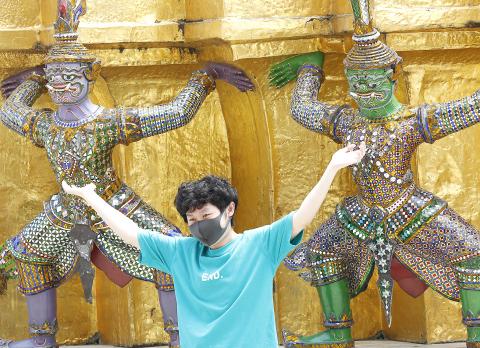The Ministry of Foreign Affairs yesterday issued a clarification regarding quarantine policies in Thailand, saying that Taiwanese visiting the nation would not be placed under quarantine if they do not have pneumonia-like symptoms.
Thai Minister of Public Health Anutin Charnvirakul on Tuesday wrote on Facebook that travelers passing through “countries or affected areas” such as Taiwan, Japan, Germany, South Korea, China, France, Singapore, Italy, Iran, Hong Kong and Macau would have to undergo a mandatory 14-day quarantine, with no exceptions.
The post was later removed without explanation.

Photo: EPA-EFE
The Thai Ministry of Public Health late last month announced that its officials would be empowered to order people suspected of being infected with COVID-19 to undergo quarantine and treatment.
That announcement has also been withdrawn, the Taipei Economic and Cultural Office in Thailand said yesterday.
Thai Deputy Prime Minister Prawit Wongsuwon on Tuesday night told reporters that there were no laws in place to enforce a quarantine.
Under Thai law, such regulations must be announced in the Royal Thai Government Gazette before they go into effect and there are have been no such announcements, Prawit said.
Department of East Asia and Pacific Affairs Deputy Director Su Ying-chun (蘇瑩君) yesterday said that the Thai ministry’s announcement was aimed at returning Thai citizens and foreigners arriving from affected areas, suggesting that these people should place themselves under self-observed quarantine if they had come into contact with COVID-19 patients or exhibited symptoms of the disease.
People traveling to Thailand from affected areas should wear masks and refrain from participating in large events, Su said.
In related news, the Ministry of Foreign Affairs decried “Chinese pressure” for a U-turn in the border policy of Malaysia’s Sarawak state, which yesterday again banned the entry of people arriving from Taiwan, despite having lifted the restriction on Tuesday.
The Sarawak state government yesterday issued an announcement prohibiting the entry of visitors who had traveled to China (including Taiwan, Hong Kong and Macau), South Korea, Italy and Iran.
The Taipei Economic and Cultural Office in Malaysia said that the about-face was the result of “strong Chinese intervention.”
Ministry spokeswoman Joanne Ou (歐江安) said that the ministry sternly reiterated to Sarawak that “Taiwan is not a part of the People’s Republic of China. Taiwan is not governed by the Chinese government.”
The change to the travel restrictions was originally made after a group of Taiwanese educators were denied entry to Sarawak on Friday last week.
The state government on Feb. 1 announced that foreign nationals who had visited China in the 14 days prior to their arrival would be refused entry.
Although Taiwan was not directly mentioned in that order, about 60 Taiwanese who arrived at Sarawak’s Miri Airport were denied entry and sent back to Kuala Lumpur, their preceding point of origin.
The group was able to enter Kuala Lumpur, but not Miri, because while the Malaysian federal government has not banned travelers from Taiwan, the Sarawak state government has its own regulations.

CARROT AND STICK: While unrelenting in its military threats, China attracted nearly 40,000 Taiwanese to over 400 business events last year Nearly 40,000 Taiwanese last year joined industry events in China, such as conferences and trade fairs, supported by the Chinese government, a study showed yesterday, as Beijing ramps up a charm offensive toward Taipei alongside military pressure. China has long taken a carrot-and-stick approach to Taiwan, threatening it with the prospect of military action while reaching out to those it believes are amenable to Beijing’s point of view. Taiwanese security officials are wary of what they see as Beijing’s influence campaigns to sway public opinion after Taipei and Beijing gradually resumed travel links halted by the COVID-19 pandemic, but the scale of

TRADE: A mandatory declaration of origin for manufactured goods bound for the US is to take effect on May 7 to block China from exploiting Taiwan’s trade channels All products manufactured in Taiwan and exported to the US must include a signed declaration of origin starting on May 7, the Bureau of Foreign Trade announced yesterday. US President Donald Trump on April 2 imposed a 32 percent tariff on imports from Taiwan, but one week later announced a 90-day pause on its implementation. However, a universal 10 percent tariff was immediately applied to most imports from around the world. On April 12, the Trump administration further exempted computers, smartphones and semiconductors from the new tariffs. In response, President William Lai’s (賴清德) administration has introduced a series of countermeasures to support affected

Pope Francis is be laid to rest on Saturday after lying in state for three days in St Peter’s Basilica, where the faithful are expected to flock to pay their respects to history’s first Latin American pontiff. The cardinals met yesterday in the Vatican’s synod hall to chart the next steps before a conclave begins to choose Francis’ successor, as condolences poured in from around the world. According to current norms, the conclave must begin between May 5 and 10. The cardinals set the funeral for Saturday at 10am in St Peter’s Square, to be celebrated by the dean of the College

CROSS-STRAIT: The vast majority of Taiwanese support maintaining the ‘status quo,’ while concern is rising about Beijing’s influence operations More than eight out of 10 Taiwanese reject Beijing’s “one country, two systems” framework for cross-strait relations, according to a survey released by the Mainland Affairs Council (MAC) on Thursday. The MAC’s latest quarterly survey found that 84.4 percent of respondents opposed Beijing’s “one country, two systems” formula for handling cross-strait relations — a figure consistent with past polling. Over the past three years, opposition to the framework has remained high, ranging from a low of 83.6 percent in April 2023 to a peak of 89.6 percent in April last year. In the most recent poll, 82.5 percent also rejected China’s